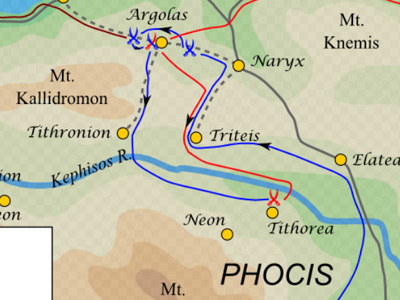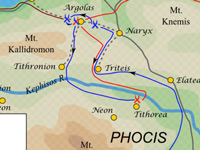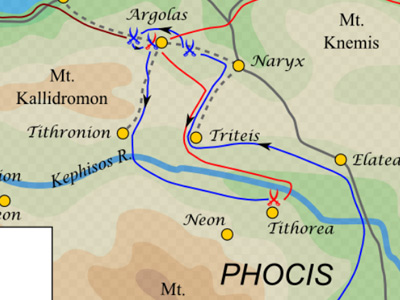Third Sacred War (356–346 BC)

Third Phase (c. 352–346 BC)
Meanwhile, the Phocians regrouped under Onomarchos's brother, Phayllos. After the huge Phocian defeats at Neon and Crocus Field, Phayllos had to resort to doubling the pay for mercenaries, in order to attract enough to replenish his army. Despite their defeats however, the majority of the Phocians were still in favour of continuing the war. Over the winter of that year, Phayllos engaged in diplomatic efforts to gather more support from Phocis's allies, and succeeding in widening the theatre of conflict in the next campaigning season. Uniquely in Greek history, the Phocians were able to absorb huge losses in manpower, thanks to their pillaging of Temple of Apollo, a factor which was to contribute to the war dragging on indecisively until 346 BC.
Fourth Boeotian campaign in Phocis (347 BC)
Philip had not involved himself in the Sacred War since his victory at the Crocus Field in 352 BC. In the meantime, it had become clear that the Sacred War could only be ended by outside intervention. The Phocians had occupied several Boeotian cities, but were running out of treasure to pay their mercenaries; conversely, the Thebans were unable to act effectively against the Phocians. The Phocian general Phalaikos was removed from his command in 347 BC, and three new generals appointed, who successfully attacked Boeotia again.
The Thebans appealed to Philip for aid, and he sent a small force to their assistance. Philip sent force enough to honour his alliance with Thebes, but not enough to end the war—he desired the glory of ending the war personally, in the manner of his choosing, and on his terms.
HISTORY

RESOURCES
This article uses material from the Wikipedia article "Third Sacred War (356–346 BC)", which is released under the Creative Commons Attribution-Share-Alike License 3.0.
© Stories Preschool. All Rights Reserved.









